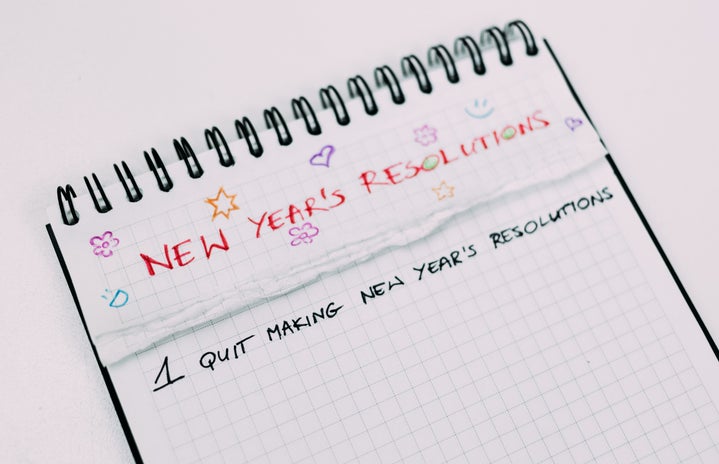I hate New Years. I never celebrate it because I find it to be such an overrated experience. Each year that I have carefully planned what was supposed to be the “best night of the year”, I have always felt underwhelmed, which has inevitably set me up for disappointment in the year ahead. There is a huge sense of pressure for young people to have the most exciting New Year’s Eve plans and if you do not have that Pinterest-worthy glamorous night, where you get drunk on champagne with your friends, watching fireworks, that feeling of inadequacy creeps in very quickly when you find that you have nothing exciting to post on your Instagram story to make sure everyone knows you are having the time of your life. Therefore, I have stopped putting high expectations on New Year’s Eve and accepting any spontaneous plans that come my way, because the reality is that it is just a night like any other.
Every New Year, we tend to find ourselves in the typical January dinner table conversations: “what are your New Year’s Resolutions?” “What do you want to change this year?”, the list goes on. Conversations like these tend to insight competition amongst our friends and family on who has the best New Year’s Resolutions and who will be able to accomplish them. I, like many, have always taken the time to set new goals for the year, using 1st January as a moment to reset. However recently, I have noticed that the New Year became an enormous excuse to not get anything done beforehand because of the ‘New Year New Me’ idea. As a result, I was delaying all my goals for this one specific day where I magically would feel the drive to accomplish all these new things. This sort of mentality, which is universally challenging, is setting us up to fail because you end up putting too many goals on your list and feeling too overwhelmed to do any of them.
According to a study led by YouGov, a quarter of the 12% of Britons who set New Year’s Resolutions in 2020, failed entirely in achieving them. This is a glaringly obvious demonstration that people are setting too big of goals and probably giving up on them because they are not seeing the results quickly enough. The best way to combat this is to understand that January is no more than the month that follows December, that every day is an evolution of the one before, and so growth is a constantly evolving process that should take place daily, no matter the day or year.
In my own experience I noticed that every year for the past four years I have written down that I want to get my driving licence, and every year it doesn’t happen (please don’t judge, I will get there eventually!). I ask myself how is this possible? The truth is, I never made enough time in my routine to get it done because it was too big of a task to complete in one year. Instead, I decided to break it down into more reasonable goals: to learn, practice and pass my theory exam. In this way, I am setting myself an “easier” goal but that once achieved, will give me much greater satisfaction and drive to pursue the next steps.
Below, I have compiled a list of the few realistic “habits” which I want to implement. I call them habits instead of resolutions because it removes the idea that they have to be achieved immediately in the New Year.
5 minutes of sunlight in the morning:
This has scientifically been proven to improve your mental health. The January blues are many Londoners’ biggest dread, so taking the time in the morning to get some light is essential to boost your mood and get you feeling motivated for the day ahead instead of feeling like you want to hibernate in bed until March.
Drinking more water:
So simple, yet so many people just tend to forget and don’t do it. If need be, you can buy one of those water bottles with marks that signpost how much you need to drink at each part of the day! Seeing your skin feel plumper and those migraines slowly fizzle away, is my motivation to stay hydrated.
Making time for activities I enjoy:
This seems to be a generic one, but I think all third years can agree that our deadlines are ruining our social lives. Last term I felt so burnt out by the end of it because I was not making time to nourish my mind and body with things I enjoy doing, which can be as simple as going out for a drink with my friends or even a 20-minute walk in the park. To do this, I am literally blocking out between 30 minutes to an hour every two days to do an activity in my calendar, to switch off from university stresses. Distracting yourself with creative activities or with people that make you laugh just makes you happier and helps you become more productive because you are allowing your brain to take a break from the high intensity work and stress. I used to convince myself that doing a leisurely activity was time wasted from my academic priorities, but the dramatic change I noticed when I would sit back down to work after a break was enormous as I felt refreshed, happier, and more motivated to work. Always rest with the same intensity as you study or work!
Making my own food:
We all can treat ourselves to a cheeky takeout or an overpriced coffee at Gail’s on Russell Square every now and then, but I have really made it a habit I want to get rid of because it is less healthy and drains my bank account. I have excavated my lunch boxes from school and slightly cringe at the thought of taking them out on campus but making my own lunch has helped me to ensure I maintain a balanced diet and so I feel a great sense of satisfaction. Plus, I can now enjoy my £4 brownie at Dillon’s Café without feeling like I’ve broken the bank!


